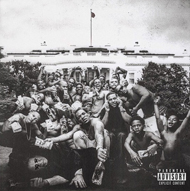 |
ReviewTrue. Musiclassroom has not been sufficiently interested in the current Rap and Hip Hop styles lately. Yet we have just discovered the latest album of very talented Kendrick Lamar, released in March 2015 and which remains for us one of the best albums of the genre."To pimp a butterfly" is a real fireworks, the synthesis of many streams such as rap, soul, hip hop, jazz. Kendrick Lamar is still at its second album, yet we detect an undeniable talent for originality, freshness and invention, which is rare in these Rap Hip hop currents that generally remain frozen in stereotypes more than "warmed" ... "Wesley's theory" opens the album with a soul melody in F #, like an old vinyl disc, but the transition is brutal on a heavy bass, backing vocals in unison and a glockenspiel atmosphere , vintage synths and hallucinatory effects. "For free" is an interlude that begins on a chord like a gospel choir, and went forth on a swing jazz frenzied pace which will graft rap voice. Here it's like in a Quincy Jones album, the famous "Back on the block". "Kunta King" is in the purest tradition hard rap from New York city. Heavy bass, regular and sharp drum loop , on which the rap voice is intercepted by female choirs. Later, synths sustaines chords reinforce the harmony in E minor. "Institutionalized" starts with a drums loop supported by type "chill out" like sustained chords, on which a detuned rap voice sings in the acute register. "These walls" install a rhythmic finger snapping, and the rap starts, interrupted by a female voice moaning and accompanied by a classical piano. "U" starts on echoing cries, drowned in an accompanying of various instruments (jazzy sax, guitar solo, various echos) a kind of "flip" guarantee atmosphere . "Allright" opens with a sample of a choir in a "Quincy Jones" style, sung by a jazzy sax and a "jungle" rhythm which then starts a few steps further. The second interlude of the album "For dirty?" paraphrases the previous title with a sample of a "soul" choir on which a blast voice introduces a Latin rhythm on the "guirro". "Momma" begins with a warm "80" armosphere where a rap and a "soul" voice are singing together, and we plunged into the atmosphere of the American Motown artists. "Hood politics" introduced a Wurlitzer piano in a Stevie Wonder atmosphere of the eightee's with 2 chords: B maj7 - Db Maj / Eb, accompanying a "radio" type rap voice . "How much has dollar cost" opens with 3 piano chords in a spanish color: (F maj - Gb / F - Ab maj / F), along with a completely shifted rhythmic snare which is a big clap reverb widely used in the titles of the 80s. "Build" remains in the atmosphere of the 80s with a heavy sharp drum loop and and a special clap on the second and fourth beats, using a wide reverb like in the previous title. Again, the choir frequently uses some soul-jazz arrangements. "The Blaker and the berry" takes us back to the atmosphere of a very actual rap already glimpsed in the opening track of the album "Wesley's theory", in a disturbing atmosphere, almost unreal. A Quincy Jones mood is back for the very jazzy-soul "You ain't gotta lie" that uses a "Pitch bend" synthesizor melody so fashionable in the 80s. Special mention for "I" that rings the revolt of black Americans people, a central theme of the album. The title begins with an angry mob on which is grafted a funky guitar with two chords: F min 7 and C7 (sus4). "Mortal man" at last revives again with the vintage atmosphere by the use of phase-shifted choir and one begins to dream of a "Weather report" atmosphere and the use of percussion instruments like marimba, xylophones, pianos.
Conclusion: This album is a true gem of inventions, unpublished experimental rap and atmospheres that would be a shame to miss. We finally get out of the usual hip hop stereotypes and we pay a tribute to this young artist, who, with no doubt, is going to really talk about him.
Yves Feger (Composer) |